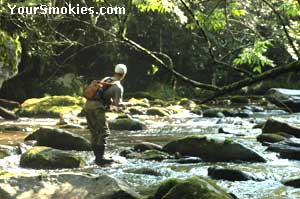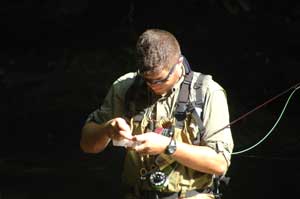
Fish from dawn to dusk in the National Park.

Fishing in the National park requires only lures.
Fishing in the more than 2,115 miles of creeks, streams, and rivers in the Great Smoky Mountain National Park can be both exciting yet relaxing for young and old alike. This popular national park is one of the last natural wild trout habitats left in the entire eastern United States. Fisheries monitoring by the Smoky Mountain Park have found that many streams in the park can contain as many as 2,000 to 4,000 4 inch to 8 inch rainbow trout per mile! Even the native brown trout are commonly found running from 8 inch to 20 inches in many streams.
Besides the native brook trout found at higher elevations (thanks to restoration efforts), and the rainbow trout, when fishing in the Smokies you will also find small mouth bass, rock bass, shiners, suckers, minnows, and darters. The Great Smoky Mountain Park alone boasts more than 53 species of fish and a huge spectrum of aquatic invertebrates and insects.


Fishing in the National Park is permitted from a 1/2 hour before sunrise to 1/2 hour after sunset year round, and there are some fishing regulations in place which much be followed.
At this time, none of the 2,900 plus miles of streams, creek and rivers in the Great Smoky Mountains National Park are closed to fishing.
A valid Tennessee or North Carolina state fishing license is required to fish in the Great Smoky Mountain National Park although a special supplemental state trout licenses are not required in the park. If you plan to fish in the park you must purchase your license in one of the nearby towns such as Gatlinburg TN, Cherokee NC, Cosby TN, Pigeon Forge TN, Townsend TN, Bryson City NC, etc as the Smoky Mountain National Park does not sell state fishing licenses.
It is important for anglers to note that the fishing license age requirements are not the same for Tennessee and North Carolina. For those children who do not require a fishing license, they are still required to abide by the adult possession limits and regulations.
For the North Carolina state fishing license if you are 16 or older regardless if you are a resident or not you are required to purchase a license. Those who are 70 or older qualify for a special senior citizen license from the state of North Carolina.
The Tennessee state fishing license requirements dictate that those 13 and older must have a valid license and anglers age 65 and older may obtain a special senior citizen license from the state.
All people fishing in the national park must show their fishing license upon demand by authorized personnel of the park.
It is important to note that you need a special tribal fishing licence to fish on the Cherokee Reservation. A North Carolina fishing licence is not neccessary nor is it recognized by the tribe.
In order to maintain healthy fishing stock, fishing bag and size limits have been set which vary by fish as well as regulations in regard to bait and lures. It is important that if you fish in the great smoky mountain national park that you know and abide by these fishing rules.
Fishing Equipment Regulations:
You are allowed to fish with only one hand-held rod per licensed fisherman. Multiple rods and fishing with nets is forbidden in the park.
Fishing Bait Regulations:
Non-native animals and fish now threaten many native fish species in the park system so to protect and preserve the delicate naturally functioning ecosystems of the Smoky Mountain Park from intentionally or accidentally introduced nonnative species of fish, animals, and plants, fishing with bait of any kind is strictly forbidden in the park.
It has been found through extensive research that bait can be contaminated with non-native organisms that may harm native fish and aquatic organisms.
You are also prohibited from collecting naturally occurring bait in the park as it can disturb the environment where natural collection of bait occurs which threatens the long term viability of the bait and fish in the surrounding area long after you are done fishing for the day.
It has also been found through research that any fish caught with bread or corn usually suffer a higher mortality rate which can change the natural fish demographics in an area.
Chumming or use or possession of any form of fish bait or liquid scent is illegal under National Park Service regulations. Just having possession of bait or liquid scent in your fishing tackle is prohibited.
Fishing Lure Regulations:
When fishing in the park you may only use artificial flies or lures with a single hook. You may fish with up to 2 flies on a leader and dropper flies may be used while angling in the park.
The use or even the possession of any double, treble, or gang hooks is prohibited.
Since many of the fish caught in the park are undersized and must be released, a single hook must be used as treble hooks cause higher fish mortality rates than single hook lure will.
Remember that any fishing tackle and equipment in your possession in the park are subject to inspection at any time by any authorized park personnel. Don't spoil your vacation (and others) by doing something foolish.
A person fishing in the national park must stop fishing immediately after obtaining the limit.
To measure a fish, lay the fish on a level surface with its nose against a flat object and then measure to the furthest point of the fishes tail. It is good idea to make a 7 inch ruler that you can keep with you out of a sturdy piece of waterproof material. Cleaning a undersize fish is not only bad sport but a prosecutable offense. Please let any undersize fish you may catch go and grow until they can reach maturity.
Trout and Smallmouth Bass:Five (5) brook trout, rainbow trout, brown trout, smallmouth bass, or a combination of these are allowed each day. This includes all fish that you may have in your possession, whether they are live, fresh, frozen, in an ice chest, or otherwise preserved the combined total fish must not exceed five in number.
There is a size limit of 7 inches for any brook trout, rainbow trout, brown trout, or smallmouth bass caught. Any fish caught under the size limit must be immediately released.
Rockbass:Up to Twenty (20) Rockbass may be kept in addition to the Trout and Smallmouth Bass limit.
There is no size limit for any Rockbass caught.
It is against the law to move rocks in streams or to even form channels or damns as both behaviors disturb the delicate environment and are harmful to fish and even aquatic insects that reside in the streams and waterways of the national park.
Many of the fish that inhabit the park spawn between the months of April and August and some of these fish build their nests in streams under small cavities under rocks and submerged branches. Many fish stay near the nest in order to guard their eggs. By disturbing the nest when moving a rock, the fishes eggs or even juvenile fish which have hatched will die.
Moving rocks or other natural objects in the water can kill or damage aquatic insects as well. Many aquatic insect species found in the Smoky Mountain Park attach themselves permanently to rocks and branches and get crushed by the movement or die from lack of food or water if moved to a different spot in the stream or surrounding area. Luckily some water borne insects can just drift away or move when disturbed.